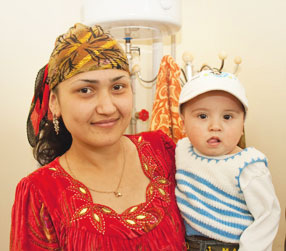 DUSHANBE. The Ministry of Health of Tajikistan, in partnership with the RVF and the U.S. Department of Defense, has just completed a nationwide deworming campaign. Epidemiologic surveys indicated that over half of the general population of Tajikistan was infected with intestinal worms. The campaign targeted the most vulnerable segments of the population for treatment: all children ages 1 – 17 years and women of child bearing age, who together make up a total of approximately 4.5 million individuals and represent over 50% of the population of the country.
DUSHANBE. The Ministry of Health of Tajikistan, in partnership with the RVF and the U.S. Department of Defense, has just completed a nationwide deworming campaign. Epidemiologic surveys indicated that over half of the general population of Tajikistan was infected with intestinal worms. The campaign targeted the most vulnerable segments of the population for treatment: all children ages 1 – 17 years and women of child bearing age, who together make up a total of approximately 4.5 million individuals and represent over 50% of the population of the country.
The campaign included two rounds of deworming in accordance with WHO recommendations. In the first round all children between the ages of 1 to 17 years and all women of childbearing age were treated with the deworming medication albendazole. The second round provided treatment to all school-age children, who range in age from 7 years to 17 years, using albendazole as well as a second deworming medication, praziquantel. Both medications were indicated for school-aged children based on a nationwide epidemiologic survey conducted by Tajik specialists, who were trained as part of the campaign.
As with all RVF programs, the deworming campaign was implemented exclusively by local public health personnel. Following the completion of the two rounds of deworming Tajik specialists conducted a second epidemiologic survey, which allowed local health officials to compare pre and post treatment rates of infestation and assess the need for follow-up measures. Rates of infection were reduced significantly post-treatment, with 6% of those surveyed infected with an intestinal parasite as compared to over 50% before the intervention.